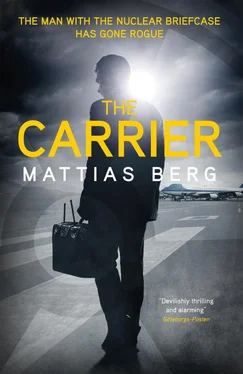Mattias Berg - The Carrier
Здесь есть возможность читать онлайн «Mattias Berg - The Carrier» весь текст электронной книги совершенно бесплатно (целиком полную версию без сокращений). В некоторых случаях можно слушать аудио, скачать через торрент в формате fb2 и присутствует краткое содержание. Город: London, Год выпуска: 2019, ISBN: 2019, Издательство: MacLehose Press, Жанр: Триллер, на английском языке. Описание произведения, (предисловие) а так же отзывы посетителей доступны на портале библиотеки ЛибКат.
- Название:The Carrier
- Автор:
- Издательство:MacLehose Press
- Жанр:
- Год:2019
- Город:London
- ISBN:978-0-85705-788-4
- Рейтинг книги:4 / 5. Голосов: 1
-
Избранное:Добавить в избранное
- Отзывы:
-
Ваша оценка:
- 80
- 1
- 2
- 3
- 4
- 5
The Carrier: краткое содержание, описание и аннотация
Предлагаем к чтению аннотацию, описание, краткое содержание или предисловие (зависит от того, что написал сам автор книги «The Carrier»). Если вы не нашли необходимую информацию о книге — напишите в комментариях, мы постараемся отыскать её.
The Carrier — читать онлайн бесплатно полную книгу (весь текст) целиком
Ниже представлен текст книги, разбитый по страницам. Система сохранения места последней прочитанной страницы, позволяет с удобством читать онлайн бесплатно книгу «The Carrier», без необходимости каждый раз заново искать на чём Вы остановились. Поставьте закладку, и сможете в любой момент перейти на страницу, на которой закончили чтение.
Интервал:
Закладка:
I nodded with impatience, already knowing enough about all this from my dissertation.
“But just then, in the program’s darkest hour, along comes this young girl, straight from high school in Kiruna. You could say she was a godsend. The word was that she was a master cryptologist, a natural talent, at seventeen years old. Before long she proved to be not only exceptionally good at encryption—but also at pulling the wool over people’s eyes. That applied to everybody: the most senior politicians as well as our immediate superiors. Formally she started as an assistant clerk, on salary grade F.2 if memory serves, and ended up as a departmental head. In practice, irreplaceable.”
“Ingrid Oskarsson.”
“Right. I should say that she could encrypt reality itself.”
I stole another look at my watch: 01.14. Eight minutes until the time by when Sixten had said that we absolutely needed to be out of here. Yet no trace of urgency in his voice.
“And not a peep was heard for thirty-five years. Not a word about the program: that Sweden had once planned to have its own nuclear weapons. Not a word about secret tests or underground laboratories, the F.O.A.’s actual role, before a series of articles came out in 1985. I cannot say that I was innocent of the cover-up. But Ingrid was the architect behind all these magnificent smokescreens and the shell organizations.”
Then he looked at his watch. Perhaps now a touch of haste in the way Sixten gathered up the mugs, plates and thermos and put them in the backpack, even though he took time to fold up the sandwich paper. When we got to our feet, I had to ask about the strange pale rectangle on the wall to the left of where I had been sitting. It looked as if somebody had removed a painting from there too.
“Yes, that’s where the control panel used to be. The one that regulated the lighting system, the diodes in the tunnels, the sliding doors up here, everything mechanical and hydraulic, all the electronics. That too disappeared without trace when the program was buried.”
Then he pressed right there, in the very center of the empty square on the wall—which opened soundlessly. At that exact moment, when the lighting across the whole floor went out and before the wall closed behind us again, I could spot the night watchman’s torch flickering in the staircase at the far end of the corridor.
“Cool,” I said.
“Oh, that’s no big deal. Just a toy. But it is amazing how much of this still works,” Sixten replied.
He hurried on ahead through the pitch-black stairwell, his headlamp unlit. I had to keep a firm hold of the handrail so as not to lose my footing. Once on level ground—I reckoned it to be a floor below the one we had come in on—he keyed in something on another concealed control panel, to judge from the sound. A circle opened up in the floor. Underneath, the red L.E.D.s showed the way back down into the underworld. Sixten continued his secret history while we followed the path.
“The objective of the military authorities was that we in Sweden should produce at least ten nuclear charges annually by the end of the ’60s. Each one of them was to have an explosive force equivalent to that of the Nagasaki bomb, that’s to say ten to twelve kilotons, and rising a good deal higher than that. I assume you must be wondering how a small country like ours could have such economic muscle—and there I can say that only part of the funds came out of the government’s published means, or out of coded transfers to the F.O.A. from other bodies within the defense department. The biggest part came from our top secret financier.”
I did not ask any follow-up questions, or did not want to reveal either my knowledge or my ignorance. At 155.5 feet below ground, the track of diodes came to an end at a massive protective steel door. Sixten pressed in the code on the control box and we passed through the shock-wave tunnel, the blast doors. Once we had passed the last lock, he gestured at the room and shook his head.
“The Plutonium Laboratory. It was in here that our First Tier nuclear weapons program foundered.”
The rock chamber was significantly smaller than all the other corresponding laboratories I had seen. When Sixten pushed the black rubber-covered button, the neon lights came slowly on. There might have been nobody in here for decades. The laboratory looked as if it had been theatrically left to history: one clean mug; an unused notepad; a loose electric lead on a desk. A collection of props from Sweden’s dreams of becoming a nuclear weapons nation. Its new era as a great power.
“And plutonium, especially Pu-239, is a gnarly little bastard, as you know, Erasmus. Not just the alpha particles and the impressive toxicity. Also pyrophoric to such a degree that it can ignite at any time, which at first made it troublesome for us even to handle the substance. Yet all of this was only a smokescreen.”
Even now, I resisted my urge to ask questions. He rapidly opened and closed the protective doors to the different laboratories, sometimes with such speed that I hardly managed to see anything. From my dissertation research, I did of course recognize the terms on the signs, even in Swedish. CRITICALITY ROOM straight ahead of me, METALLURGY to the left, MECHANICAL INITIATION to the right and further along the same side NUCLEAR INITIATION. Beautiful capital letters in chrome, seemingly covered in the same red-gray gunpowder dust as in the Test Rooms. The march of history.
We passed the air locks at the far end of the laboratory and were suddenly out in the tunnel system again, on the far side of the Plutonium Laboratory. Sixten picked up his story, in the dreamlike glow of the diodes—as the history itself grew ever more unreal.
“And all the time we had to move ever deeper into the bed-rock. For Second and Third Tier development we needed highly specialized sites, with only the smallest number of the select few having any insight. That’s when we had the Test Rooms blasted out. 325 feet down in the bed-rock of the Fenno-Scandinavian Shield. We chose an exclusive little team of researchers, highly qualified but also sufficiently old that they would probably not be alive when the secrets leaked out, as eventually they would. So that they could never be witnesses.”
Sixten’s voice became hoarse, almost a whisper.
“And our researchers did die, as planned, one after the other—but much quicker than expected. Partly due to age and partly the secondary effects, I would guess. At first I admit I saw it more as a curse: something along the lines of what happened after Tutankhamun’s tomb was opened, and I just awaited my turn. But when nothing happened, I started to think about exposure times and realized that the researchers had spent far more time down there than Ingrid and I did. And when I then came down to the Test Rooms again, a year or two ago, for the first time in four decades, I got to see how dreadful the condition of the animals and humans in the display cases was. Then it wasn’t hard to imagine how the researchers had gone through the same process of systematic disintegration.”
He stopped, turned to me. In spite of the weak light from the diodes on the tunnel floor I could clearly see Sixten’s face twist into a grimace. How the stiff and correct mask lapsed—and suddenly he threw his arms around me.
“I’m sorry, Erasmus, but it’s just so dreadful! What we did then, without really knowing anything about the effects, and what you are still doing… so desperately looking for the formula to exterminate ourselves. Isn’t that utterly incomprehensible?”
I nodded. There was so much I wanted to ask, all these veiled remarks, stifled indications. But I knew that the mussel could snap forever shut if one was too eager to get at the pearl. That’s what Edelweiss used to say.
Читать дальшеИнтервал:
Закладка:
Похожие книги на «The Carrier»
Представляем Вашему вниманию похожие книги на «The Carrier» списком для выбора. Мы отобрали схожую по названию и смыслу литературу в надежде предоставить читателям больше вариантов отыскать новые, интересные, ещё непрочитанные произведения.
Обсуждение, отзывы о книге «The Carrier» и просто собственные мнения читателей. Оставьте ваши комментарии, напишите, что Вы думаете о произведении, его смысле или главных героях. Укажите что конкретно понравилось, а что нет, и почему Вы так считаете.












